- Home
- Jennifer Donnelly
A Northern Light Page 16
A Northern Light Read online
Page 16
I opened my eyes again and saw her looking up at me. Lou and Beth looked up, too. Even Pa did. Dehiscence was my word of the day. It is a fine word, a five-dollar word. It means when pods or fruits burst open so that their seeds can come out. How was it that I could learn a new word every day yet never know the right ones to tell my family how I felt?
"Nothing's wrong. I'm fine. Just tired, that's all. I ... I think I forgot to latch the barn door," I lied, then ran to the shed, grabbed my shawl, and kept going. Out into the yard, past the garden and the outhouse, past the black earth of the cornfields.
I kept going until I got to the eastern edge of Pa's land, where the fields give way to woods and there's a stream, and just past it, a small clearing ringed with tamaracks. To the place where my mother is buried.
I could hardly breathe by the time I got there. I walked around and around her grave, trying to get hold of myself. My head felt giddy and light, like the time Minnie and I filched brandy from her father's cupboard. Only this time it wasn't alcohol I'd had too much of. It was books. I should have stopped after Zola and Hardy, but I hadn't. I'd gone right on like a greedy pig to Leaves of Grass by Walt Whitman, Songs of Innocence by William Blake, and A Distant Music by Emily Baxter.
I'd borrowed the volumes of poetry on Saturday, when I'd gone back to Miss Wilcox's house to start organizing her books. "You can keep this one, Mattie," she'd said about the Baxter, "but keep it to yourself." I didn't need telling. I'd heard all about A Distant Music. I'd read articles about it in Aunt Josie's cast-off newspapers. They said that Emily Baxter was "an affront to common decency," "a blight on American womanhood," and "an insult to all proper feminine sensibilities." It had been banned by the Catholic Church and publicly burned in Boston.
I thought there would be curse words in it for sure, or dirty pictures or something just god-awfully terrible, but there weren't—only poems. One was about a young woman who gets an apartment in a city by herself and eats her first supper in it all alone. But it wasn't sad, not one bit. Another was about a mother with six children, who finds out she's got a seventh coming and gets so low spirited, she hangs herself. One was about Penelope, the wife of Ulysses, setting fire to her loom and heading off to do some traveling herself. And one was about God being a woman instead of a man. That must've been the one that made the pope boiling mad.
Jeezum ... What if God was a woman? Would the pope be out of a job? Would the president be a woman, too? And the governor? And the sheriff? And when people got married, would the man have to honor and obey? Would only women be allowed to vote?
Emily Baxter's poems made my head hurt. They made me think of so many questions and possibilities. Reading one was like pulling a stump. You got hold of a root and tugged, hoping it would come right up, but sometimes it went so deep and so far, you were halfway to the Loomis farm and still pulling.
I took a deep breath. I smelled wet earth and evergreens and the dusk coming down, and they calmed me some. I was agitated something fierce. There was a whole other world beyond Eagle Bay, with people like Emily Baxter in it, thinking all the things you thought but weren't supposed to. Writing them, too. And when I read what they'd wrote, I wanted to be in that world. Even if it meant I had to leave this one. And my sisters. And my friends. And Royal.
I stopped pacing and hugged myself for warmth. My eyes fell on my mamma's headstone, ELLEN GOKEY. BELOVED WIFE AND MOTHER. BORN SEPTEMBER 14, 1868. DIED NOVEMBER 11, 1905. Her maiden name was Robertson, but Pa wouldn't allow it on the headstone. Her father had disowned her for marrying my pa. He'd forbidden the match, but my mamma went against him. She loved to tell the story of her courtship with Pa. Pa didn't like the stories; he'd always leave the room when she started. We liked them, though. Especially the one about how she'd seen him for the first time showing off at her father's sawmill on the Raquette River. He was biding a log with another lumberjack, trying to knock him off. Whoever lost had to give the other man his bandanna. My pa saw my mother watching, dumped the other man in the water, and gave her his bandanna. She was buried with it in her hand.
Mamma also liked to tell us how Pa had asked her to marry him in the woods, in the dead of winter, under a bough of snowy pine branches. And how—on the night they'd eloped—he'd told her to take just a carpetbag with her. "Pack your most important things," he'd said, thinking she would know he meant dresses and boots and underthings and such, but she was so young and giddy, she'd packed her favorite books, a box of caramels, and her jewelry. He'd had to sell a gold bracelet right off to get her some clothes. He'd wanted to sell the books, not the bracelet, but she wouldn't let him.
I hardly recognized the man in those stories as my pa, but I recognized my mother in them. I missed her all the time, my mamma, and I missed her dreadfully just then. I wondered what she would make of Emily Baxter. I wondered if she'd scold me for reading such a book, or touch a finger to her lips and smile and say, "Don't tell Pa," like she did when she spent money he'd given her for nails or paint on ribbons and candy.
I traced the letters of my mother's name on the cold gray stone and conjured my favorite memories of her. I saw her reading to us at night from Little Women or The Last of the Mohicans, or reading us stories from Peterson's Magazine like "Aunt Betsey's Best Bonnet" or "Flirting on Skates." I saw her reading the poems I wrote her for Valentine's Day and her birthday. She used to tell me that I wrote real nice, as nice as the poems on the fancy cards at Cohen's in Old Forge. As nice as Louisa May Alcott, even.
I remembered her singing as she cooked. And standing downstairs in the root cellar in November, smiling at all the food she'd put up. I remember how she made us fancy braided hairdos and how she trudged through the winter fields on snowshoes to bring Emmie Hubbard's kids a pot of stew.
I tried very hard to remember only the good things about my mamma. To remember her the way she was before she got sick. I wished I could cut the rest out of me the way the doctor tried to cut the cancer out of her, but I couldn't. No matter how hard I struggled to keep my last images of her at bay, they came anyway.
I saw her as she looked right before she died, her body wasted, her face hollowed out.
I saw her as she wept and moaned with pain. And as she screamed and threw things at us, her sunken eyes suddenly bright with rage.
I saw her as she pleaded with the doctor and Pa and Aunt Josie and the Reverend Miller not to let her die. As she kissed Lawton and me and my sisters over and over again, pressing our faces between her hands. As she cried and cried, frantically telling me that Pa didn't know how to braid hair or mend a dress or put up beans.
I saw her as she begged me never to go away, as she made me promise to stay and take care of her babies.
And I saw myself, tears in my eyes, promising her I would.
The memories faded. I opened my eyes. The peepers had started up. It was getting late. Pa would be wondering where I was. As I turned to go, I nearly trod on the body of a young robin half hidden in the grass. Its wings were twisted and bent. Its body stiff and bloodied.
A hawk's work, I thought, wondering if the robin had seen the brilliant blue of the sky and felt the sun on its back before its wings were broken.
Mattie, shut the light! What are you doing up?" a voice hisses in the darkness.
"Nothing, Ada," I say, quickly tucking Grace Browns letter back in its envelope. "Just reading."
"At this hour? Go to sleep, for cripes' sake! Cook'll have us up soon enough!"
"Stop your damn noise, you two!"
"You don't want to let Cook hear you curse, Fran," Ada warns. "She'll box your ears."
"I'll box yours if you don't shut up, I swear I will—"
"Box my ears? I'm not the one who lit the lamp and woke the whole room! And after the day we've had ... after everything that's happened..." Ada's voice catches and turns to tears.
"I'm sorry, Ada. I'll shut the light, all right? There, it's out. Go back to sleep now."
There's a gulp, a sniffle, and then, "She's right
downstairs, Matt. All cold and dead."
"Then she won't be bothering you, will she? Go to sleep."
I mean to go to sleep, too. I try to, but I can't. Every time I shut my eyes, I see Grace's battered face. I hear Mr. Morrison tell Mr. Sperry that there's no Carl Grahm in Albany.
I wait for a bit. Until I hear no bedsprings creaking, no sighs or groans as some girl tries to make herself comfortable in the heat. And then quietly, carefully, I unfold the letter again. I only get the pages open partway, when they crinkle. I stop and hold my breath, waiting for Ada or Fran to scold again, but neither of them stirs. It's dark in the room now, but there's a window next to my bed and I can make out Grace's words if I hold her pages in the moonlight.
South Otselic
June 23, 1906
My Dear Chester—
I am just wild because I don't get a letter from you. If you wrote me Tues. night and posted it Wed. morning there isn't any reason why I shouldn't get it. Are you sure you addressed the Utter right? I have been home nearly a week and have not had one line from you ... When I didn't hear from you Thurs. morning I cried and as a result had a nervous headache and stayed in bed all day. You can't blame me, dear, for of course I thought of everything under the sun. That night when my brother came up he said that if I would get up early he would take me driving ... I was so tired and went to bed for an hour after getting home; then I went downstairs and got some dinner all alone. Now, dear, I know you are laughing—in fact, I can hear you, almost—but honestly I had splendid luck. My brother, who seldom says a word in praise of anything, said, "It's not half bad, Billy" That is a whole lot for him to say ... I miss you, oh dear, you don't know how much I miss you ... I am coming back next week unless you can come for me right away. lam so lonesome I can't stand it. Week ago tonight we were together. Don't you remember how I cried, dear? I have cried like that nearly all the time since I have left Cortland...
There is no Carl Grahm, only a Chester, a "Dear Chester." He lived in Cortland, not Albany, because the letters are addressed to him there. And Grace lived there, too, at some point, even though the return address on her letters says South Otselic, because she mentions she left the place, and says she will come back if he doesn't come for her.
...I am awfully blue ... I was telling Mamma yesterday how you wrote and I never got it and she said "Why Billy, if he wrote you would have received it." She didn't mean anything but I was mad and said, "Mamma, Chester never lies to me and I know he wrote." If you were only here dear, how glad I would be ... they are calling me to dinner and I will stop. Please write me or I shall be crazy...
"Frannie says someone struck her," Ada whispers, making me jump. "She went to look at her after supper. She said there was a huge bloody cut on her face. And bruises."
"Frannie embroiders. You know that. Why are you up again?"
"Can't stay asleep. You saw her, Matt. What did she look like?"
"Like someone who drowned."
"Cook says the undersheriff's on his way. And the coroner. And the strict attorney."
"The district attorney."
"And the men from the Utica paper. Do you think they'll put us in the paper?"
"Go to sleep, Ada. You heard Cook. We'll be busier than ever tomorrow."
"Are those letters from Royal?"
"Urn ... yes. Yes, they are."
"There are so many. It'll take you all night to read them. You must love him."
I don't say anything in reply.
Ada rolls over and I open another letter. It has no greeting.
S. Otselic
Sunday Night
I was glad to hear from you and surprised as well. I thought you would rather have my letters affectionate, but yours was so businesslike that I have come to the conclusion that you wish mine to be that way ... I think—pardon me—that I understand my position and that it is rather unnecessary for you to be so frightfully frank in making me see it. I can see my position as keenly as any one I think ... You tell me not to worry and think less about how I feel and have a good time. Don't you think if you were me you would worry?...I understand how you feel about the affair. You consider it as something troublesome that you are bothered with. You think if it wasn't for me you could do as you liked all summer and not be obliged to give up your position there. I know how you feel, but once in a while you make me see these things a great deal more plainly than ever. I don't suppose you have ever considered how it puts me out of all the good times for the summer and how I had to give up my position there...
Was Grace sick? I wonder. Is that why she had to give up her position? Did they work at the same place? Maybe at that place Mr. Sperry was talking about—the skirt factory that the well-heeled Cortland Gillettes owned. But why would they both have to give up their positions? It didn't make any sense.
...Chester, I don't suppose you will ever know how I regret being all this trouble to you. I know you hate me and I can't blame you one bit. My whole life is ruined and in a measure yours is, too. Of course it's worse for me than for you, but the world and you, too, may think lam the one to blame, but somehow leant—just simply can't think I am, Chester. I said no so many times, dear. Of course the world will not know that but it's true all the same. My little sister came up just a minute ago with her hands full of daisies and asked me if I didn't want my fortune told. I told her I guessed it was pretty well told...
My eyes latch on to one line again: "I said no so many times, dear"...and then I gasp out loud, because I have said no a few times myself, dear, and I finally understand why Grace was so upset: She was carrying a baby—Chester Gillette's baby. That's why she had to give up her position and go home. That's why she was so desperate for him to come and take her away. Before her belly got big and the whole world found out.
And then I think of something else ... that I am the only person, the only person in the entire world, who knows this.
I fold the letter, slide it back into its envelope, and look out the window. It's so dark outside and there is no sign of the dawn.
Break a promise to the dead and they'll haunt you, Ada says.
Keep the promise and they'll haunt you just the same.
mal • e • dic • tion
It was a Saturday, my very favorite day of the week, for on Saturdays I got to work in Miss Wilcox's library. I had just trotted up the back steps to her house and was standing on the porch, about to knock on her door, when I heard voices inside. Loud, angry voices.
"And what about your father? And Charlotte? And Iverson Junior? The shame of it all! They can't even go out in public! Have you never once thought of them, Emily?" That was a man's voice.
"They're not children. They'll manage. Annabelle does." That was Miss Wilcox.
I raised my hand to knock, then lowered it again. Miss Wilcox was expecting me and I had plenty of work to do, but this was surely a private discussion and I thought maybe she'd prefer for me to come back later. I didn't know what to do, so I stood there dithering.
"How did you find me? Whom did you pay to inform on me? And how much?"
"Emily, just come home."
"Under what conditions, Teddy? Knowing you, there will be conditions."
"There's to be no more scribbling, no more foolishness. You're to come home and take up your duties and responsibilities. If you do, I promise I will do my best to forget any of this ever happened."
"I can't. You know I can't."
There were a few seconds of silence and then the man spoke again. He wasn't shouting anymore. His voice was calm and steady and all the more frightening for it.
"What you've done is not only embarrassing and distressing, Emily, it is immoral. Threnody should never have been written, never mind published. Anthony Comstock has involved himself. Do you know who he is?"
"The applesauce king?"
I did not know Miss Wilcox could be so flippant. I didn't think she should be. Not around an angry man.
"He's the secretary for the Society for the Suppressi
on of Vice. He's ruined people, driven some to suicide. Never in all my born days did I think I would see your name alongside the names of deviants and pornographers."
"I am neither a deviant nor a pornographer, Teddy. You know this. And the odious Mr. Comstock does as well."
"He says you are obscene. And when Comstock says something, the entire country listens. You are doing grievous injury to the names of Wilcox and Baxter, Emily. I will seek help for you if you refuse to seek it yourself."
"Meaning what, Teddy?"
"My meaning is perfectly clear."
"No, it damn well isn't! Have some guts for once in your life! Say what you mean!"
"You leave me no choice, Emily. If you do not come home—on my conditions—I will sign you over to a doctors care."
There was a terrible crash and the sound of glass breaking, and then I heard Miss Wilcox scream, "Get out! Get out!"
"Miss Wilcox! Miss Wilcox, are you all right?" I shouted, banging on the door.
The door was wrenched open and a man stormed by me. I think he would have knocked me right on my backside if I hadn't stepped out of his way. He was tall and pale, with fine dark hair and a mustache, and he barely gave me a glance.
I ran inside, frightened for my teacher. "Miss Wilcox!" I shouted. "Miss Wilcox, where are you?"
"In here, Mattie."
I hurried into the library. The writing table had been upended. Papers were all over the floor. The beautiful red apple paperweight had been smashed to bits. My teacher was standing in the middle of the room, smoking.

 Rogue Wave
Rogue Wave Waterfire Saga, Book One: Deep Blue (A Waterfire Saga Novel)
Waterfire Saga, Book One: Deep Blue (A Waterfire Saga Novel) Revolution
Revolution The Wild Rose
The Wild Rose Waterfire Saga (4 Book Series)
Waterfire Saga (4 Book Series)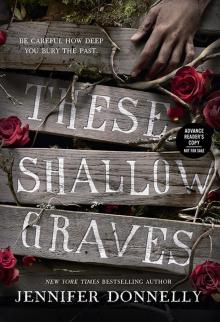 These Shallow Graves
These Shallow Graves Beauty and the Beast: Lost in a Book
Beauty and the Beast: Lost in a Book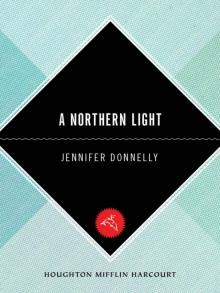 A Northern Light
A Northern Light The Tea Rose
The Tea Rose Waterfire Saga, Book Three: Dark Tide: A Deep Blue Novel
Waterfire Saga, Book Three: Dark Tide: A Deep Blue Novel The Winter Rose
The Winter Rose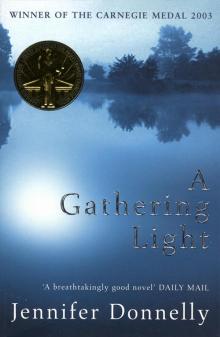 A Gathering Light
A Gathering Light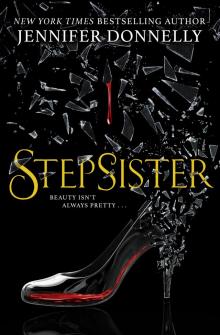 Stepsister
Stepsister Waterfire Saga, Book Four: Sea Spell: Deep Blue Novel, A
Waterfire Saga, Book Four: Sea Spell: Deep Blue Novel, A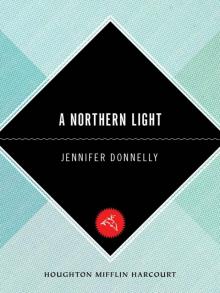 Northern Light
Northern Light Winter Rose, The
Winter Rose, The